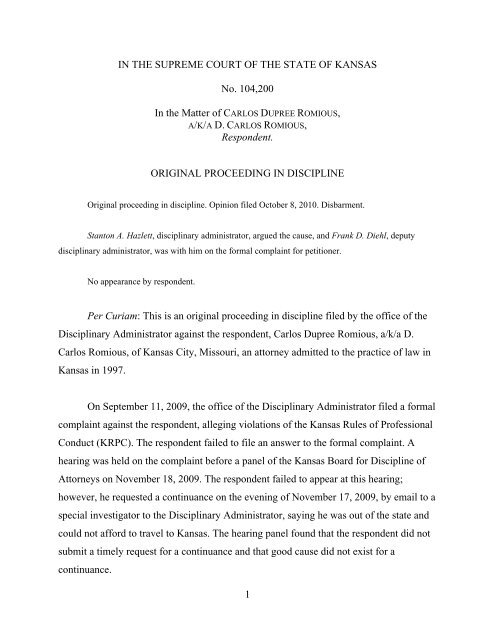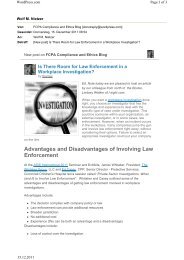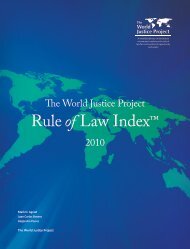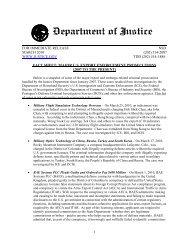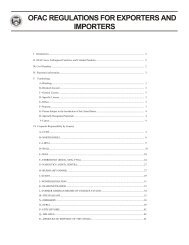Kansas Supreme Court - 104200 â In re Romious â Per Curiam
Kansas Supreme Court - 104200 â In re Romious â Per Curiam
Kansas Supreme Court - 104200 â In re Romious â Per Curiam
You also want an ePaper? Increase the reach of your titles
YUMPU automatically turns print PDFs into web optimized ePapers that Google loves.
IN THE SUPREME COURT OF THE STATE OF KANSASNo. 104,200<strong>In</strong> the Matter of CARLOS DUPREE ROMIOUS,A/K/A D. CARLOS ROMIOUS,Respondent.ORIGINAL PROCEEDING IN DISCIPLINEOriginal proceeding in discipline. Opinion filed October 8, 2010. Disbarment.Stanton A. Hazlett, disciplinary administrator, argued the cause, and Frank D. Diehl, deputydisciplinary administrator, was with him on the formal complaint for petitioner.No appearance by <strong>re</strong>spondent.<strong>Per</strong> <strong>Curiam</strong>: This is an original proceeding in discipline filed by the office of theDisciplinary Administrator against the <strong>re</strong>spondent, Carlos Dup<strong>re</strong>e <strong>Romious</strong>, a/k/a D.Carlos <strong>Romious</strong>, of <strong>Kansas</strong> City, Missouri, an attorney admitted to the practice of law in<strong>Kansas</strong> in 1997.On September 11, 2009, the office of the Disciplinary Administrator filed a formalcomplaint against the <strong>re</strong>spondent, alleging violations of the <strong>Kansas</strong> Rules of ProfessionalConduct (KRPC). The <strong>re</strong>spondent failed to file an answer to the formal complaint. Ahearing was held on the complaint befo<strong>re</strong> a panel of the <strong>Kansas</strong> Board for Discipline ofAttorneys on November 18, 2009. The <strong>re</strong>spondent failed to appear at this hearing;however, he <strong>re</strong>quested a continuance on the evening of November 17, 2009, by email to aspecial investigator to the Disciplinary Administrator, saying he was out of the state andcould not afford to travel to <strong>Kansas</strong>. The hearing panel found that the <strong>re</strong>spondent did notsubmit a timely <strong>re</strong>quest for a continuance and that good cause did not exist for acontinuance.1
The hearing panel determined that <strong>re</strong>spondent violated KRPC 1.1 (2009 Kan. Ct.R. Annot. 410) (competence); 1.5(a) (2009 Kan. Ct. R. Annot. 460) (fees); 3.4(c) (2009Kan. Ct. R. Annot. 552) (fairness to opposing party and counsel); 3.5(d) (2009 Kan. Ct.R. Annot. 558) (engaging in undignified or discourteous conduct degrading to a tribunal);4.4(a) (2009 Kan. Ct. R. Annot. 572) (<strong>re</strong>spect for rights of third persons); 8.4(b) (2009Kan. Ct. R. Annot. 602) (commission of a criminal act <strong>re</strong>flecting adversely on thelawyer's honesty, trustworthiness or fitness as a lawyer); 8.4(c) (engaging in conductinvolving mis<strong>re</strong>p<strong>re</strong>sentation); 8.4(d) (engaging in conduct p<strong>re</strong>judicial to theadministration of justice); 8.4(g) (engaging in conduct adversely <strong>re</strong>flecting on lawyer'sfitness to practice law); and <strong>Kansas</strong> <strong>Sup<strong>re</strong>me</strong> <strong>Court</strong> Rule 211(b) (2009 Kan. Ct. R. Annot.321) (failu<strong>re</strong> to file answer in disciplinary proceeding). Upon conclusion of the hearing,the panel made the following findings of fact and conclusions of law, together with its<strong>re</strong>commendation to this court:"FINDINGS OF FACT. . . ."2. On October 8, 2008, the <strong>Kansas</strong> <strong>Sup<strong>re</strong>me</strong> <strong>Court</strong> suspended theRespondent's license to practice law for failing to comply with the annual administrative<strong>re</strong>qui<strong>re</strong>ments to maintain a law license. The Respondent's license <strong>re</strong>mains suspended."Count I – DA10509"Municipal <strong>Court</strong> of Shawnee, <strong>Kansas</strong>, Conduct3. The Respondent <strong>re</strong>p<strong>re</strong>sented Christopher D. Falkner in a traffic casepending in the Shawnee, <strong>Kansas</strong>, Municipal <strong>Court</strong>, case number T08197971."4. On April 16, 2008, after the docket had been concluded in the Municipal<strong>Court</strong> of Shawnee, <strong>Kansas</strong>, the Respondent approached the Municipal <strong>Court</strong> Clerk's2
"10. As a <strong>re</strong>sult of the Respondent's conduct in the Municipal <strong>Court</strong>, on May1, 2008, the Johnson County District Attorney's office charged the Respondent withdisorderly conduct. During the pendency of the case, the Respondent failed to appear incourt as orde<strong>re</strong>d on th<strong>re</strong>e occasions. The Respondent failed to appear May 16, 2008, andApril 10, 2009. <strong>In</strong> October, 2009, Ms. Manthei and other witnesses appea<strong>re</strong>d in court fortrial. The Respondent, however, failed to appear. The trial was continued to November25, 2009. [Footnote: According to the Johnson County District <strong>Court</strong> website, onNovember 25, 2009, an attorney appea<strong>re</strong>d in behalf of the Respondent. The attorneyente<strong>re</strong>d a plea of guilty in behalf of the Respondent. The court sentenced the Respondentto serve four days in the county jail. The Respondent <strong>re</strong>ceived c<strong>re</strong>dit for time served andthe case was closed.]"Count II – DA10509"Federal <strong>Court</strong> Conduct"11. On May 6, 2008, the Respondent ente<strong>re</strong>d the north door of the United States<strong>Court</strong>house at 500 State Avenue, <strong>Kansas</strong> City, <strong>Kansas</strong>. At a station manned by courtsecurity officers inside the doorway, the Respondent <strong>re</strong>moved items from his pockets,placed the items in a tray, and walked through the magnetometer. The alarm on themagnetometer sounded."12. A court security officer told the Respondent to <strong>re</strong>turn to the entry side ofthe magnetometer, <strong>re</strong>move his wristwatch, and walk through the magnetometer again.The Respondent <strong>re</strong>fused. The Respondent became very loud and began using profanelanguage to the court security officers."13. The court security officers <strong>re</strong>peatedly told the Respondent to <strong>re</strong>turn to theentry side of the magnetometer or leave the building. The Respondent continued to<strong>re</strong>fuse[] to comply and began shouting profanities at the court security officers. Despitethe fact that the Respondent had not been clea<strong>re</strong>d by the court security officers, theRespondent started walking toward the elevators. The court security officers told theRespondent to stop and to <strong>re</strong>turn to the entry side of the magnetometer. The Respondent4
did not stop. The court security officers <strong>re</strong>peated in a louder voice that the Respondentshould stop and <strong>re</strong>turn to the security a<strong>re</strong>a. The Respondent stopped walking toward theelevators but continued using profane language toward the court security officers."14. The court security officers called the United States Marshal's Office forassistance. Several Deputy United States Marshals <strong>re</strong>sponded, including Deputy MarshalSean Franklin."15. Deputy Marshal Franklin told the Respondent to leave the courthouse.The Respondent <strong>re</strong>fused to do so. The Respondent told Deputy Marshal Franklin that hewould have to move him. Deputy Marshal Franklin put a hand on the Respondent and theRespondent shoved Deputy Marshal Franklin. Deputy Marshal Franklin took theRespondent to the floor. The struggle between Deputy Marshal Franklin and theRespondent continued, knocking over the magnetometer and going through a set ofdoors. Eventually, the Respondent was placed under ar<strong>re</strong>st. Deputy Marshal Franklin<strong>re</strong>ceived minor injuries in the incident."16. On May 14, 2008, a grand jury of the United States District <strong>Court</strong> for theDistrict of <strong>Kansas</strong> indicted the Respondent in case number 08-20056CM in a th<strong>re</strong>e countcomplaint with (1) failing to comply with official signs of a prohibitory, <strong>re</strong>gulatory, anddi<strong>re</strong>ctory natu<strong>re</strong> and with the lawful di<strong>re</strong>ction of Federal police officer, (2) exhibitingdisorderly conduct that c<strong>re</strong>ated loud and unusual noise and a nuisance and un<strong>re</strong>asonablyobstructed the use of an entrance, foyer, and lobby of the United States <strong>Court</strong>house, and(3) <strong>re</strong>sisting, opposing, impeding, and interfering with Sean Franklin and SteveMakarunis in the performance of their official duties. The first two charges we<strong>re</strong>misdemeanors and the third charge was a felony."17. On December 18, 2008, the Respondent ente<strong>re</strong>d into a plea ag<strong>re</strong>ement.Pursuant to the plea ag<strong>re</strong>ement, the Respondent ente<strong>re</strong>d a plea of guilty to count one ofthe indictment. The <strong>Court</strong> sentenced the Respondent to 30 days and gave c<strong>re</strong>dit to theRespondent for time served."Count III – DA10520"Rep<strong>re</strong>sentation of Alta V. Vaughn, Sr.5
"18. The Respondent <strong>re</strong>p<strong>re</strong>sented Alta V. Vaughn, Sr. in the Circuit <strong>Court</strong> ofG<strong>re</strong>en County, Missouri, case number 31106CF0085. During the period of<strong>re</strong>p<strong>re</strong>sentation, the Respondent engaged in abusive and bizar<strong>re</strong> behavior."19. On April 24, 2008, the Respondent was in a G<strong>re</strong>en County, Missouri,courtroom. During a hearing on a motion to supp<strong>re</strong>ss in a case which the Respondent wasnot involved, the Respondent loudly and rudely interrupted the proceeding. TheRespondent accused the court of having a pattern and history of scheduling theRespondent's cases at the end of the docket."20. On June 16, 2008, June 17, 2008, and June 18, 2008, the court in G<strong>re</strong>enCounty, Missouri held a p<strong>re</strong>-hearing confe<strong>re</strong>nce in the Vaughn case. Throughout thehearing, the Respondent made loud and rude statements."21. On June 16, 2008, the Respondent asserted that the proceeding was a'joke' and a 'travesty.' The Respondent accused the judge of 'appa<strong>re</strong>nt <strong>re</strong>ckless, bias,p<strong>re</strong>judice, and potentially racist activity and conduct.' The Respondent told the judge thatthe 'proceeding was a joke' and that the judge was 'going to sit [his] ass up the<strong>re</strong>.' TheRespondent accused the court of 'corrupting and stinking up the case' and 'corrupting thesystem.' Finally, during the hearing on June 16, 2008, the Respondent <strong>re</strong>peatedly spokeover the judge and opposing counsel in a loud, rude, and angry manner. The Respondent<strong>re</strong>fused to stop talking when so orde<strong>re</strong>d by the judge."22. On June 17, 2008, the Respondent accused the court of 'being anythingbut impartial, justiciable, and anything but incompetent.' The Respondent wadded up acopy of a pleading filed by opposing counsel, th<strong>re</strong>w it to the floor, and, using his shoe,ground it into the floor. When the court orde<strong>re</strong>d the Respondent to appear the followingmorning at 8:00 a.m., the Respondent <strong>re</strong>fused to appear. The Respondent told the court'to not expect him to be he<strong>re</strong>' and that he should not 'hold [his] b<strong>re</strong>ath.' Again, theRespondent <strong>re</strong>peatedly spoke over the judge and opposing counsel in a loud, rude, andangry manner. Again, the Respondent <strong>re</strong>fused to stop talking when orde<strong>re</strong>d to stop by thecourt.6
"23. The hearing <strong>re</strong>sumed on June 18, 2009, and the Respondent did appear.During that hearing, the Respondent asked the court whether he is a 'pedophile.' TheRespondent also stated to the court that 'you'<strong>re</strong> going to sit up the<strong>re</strong> with the audacity andthe smugness of your holiness.' Finally, and again, the Respondent <strong>re</strong>peatedly spoke overthe judge and opposing counsel in a loud, rude, and angry manner. The Respondent,again, <strong>re</strong>fused to stop talking over the judge and opposing counsel when orde<strong>re</strong>d to do soby the court."24. As a <strong>re</strong>sult of the Respondent's conduct on June 16, 2008, June 17, 2008,and June 18, 2008, the court held the Respondent in contempt and sentenced theRespondent to serve 120 days in jail. The Respondent served the enti<strong>re</strong> sentence. (The<strong>re</strong>was no di<strong>re</strong>ct testimony on this incident at the hearing. However, DisciplinaryAdministrator's Exhibit 9, Judgment of Contempt and Disciplinary Administrator'sExhibit 14, letter from the Respondent to Nancy Wilson, dated April 6, 2009, whe<strong>re</strong>in theRespondent admits engaging in complained of conduct, provide the factual basis for thiscount.)"Count IV – DA10529"Rep<strong>re</strong>sentation of [J.J.]"25. The Respondent was a captain in the <strong>Kansas</strong> Army National Guard. As a<strong>re</strong>sult, from time to time, the Respondent would be appointed to <strong>re</strong>p<strong>re</strong>sent soldiers with<strong>re</strong>gard to military offenses."26. <strong>In</strong> the fall of 2007, [J.J.] was charged in a two count complaint in theDistrict <strong>Court</strong> of Johnson County, <strong>Kansas</strong>, case number . . . . The charges we<strong>re</strong> drivingunder the influence of alcohol and possession of drugs, both misdemeanors. [J.J.] was asoldier with the <strong>Kansas</strong> Army National Guard."27. [J.J.], with help from his mother and step-father, hi<strong>re</strong>d J. StevenNeighbors to <strong>re</strong>p<strong>re</strong>sent him in the criminal case. [J.J.]'s mother paid Mr. Neighbors$1,500.00 for the <strong>re</strong>p<strong>re</strong>sentation in the criminal case. Mr. Neighbors is a very experiencedcriminal law attorney.7
"28. With <strong>re</strong>gard to military action that could have been taken against [J.J.],as a <strong>re</strong>sult of the criminal charges, [J.J.] <strong>re</strong>quested that a Judge Advocate General beappointed to defend him. As a <strong>re</strong>sult, the Respondent was appointed to <strong>re</strong>p<strong>re</strong>sent [J.J.]with <strong>re</strong>gard to any military action taken against him. The Respondent was not appointedto <strong>re</strong>p<strong>re</strong>sent [J.J.] in the pending criminal case in the District <strong>Court</strong> of Johnson County,<strong>Kansas</strong>."29. At some point, [J.J.]'s mother talked with the Respondent about having ameeting with the family, Mr. Neighbors, and the Respondent to make su<strong>re</strong> that everyoneunderstood what was happening with <strong>re</strong>gard to [J.J.]'s futu<strong>re</strong>."30. Mr. Neighbors negotiated a plea ag<strong>re</strong>ement. Pursuant to the pleaag<strong>re</strong>ement, the Respondent was to enter a plea of guilty to the driving under the influenceof alcohol charge and in <strong>re</strong>turn, the prosecutor would dismiss the possession of drugscharge. The plea ag<strong>re</strong>ement was satisfactory to [J.J.], his mother, his step-father, and hisfather."31. The Respondent was to enter his plea of guilty to the driving under theinfluence of alcohol charge on April 11, 2008, at 1:30 p.m."32. An hour befo<strong>re</strong> the hearing, [J.J.] and his pa<strong>re</strong>nts we<strong>re</strong> to meet with theRespondent about [J.J.]'s futu<strong>re</strong>. [J.J.] and his pa<strong>re</strong>nts we<strong>re</strong> p<strong>re</strong>sent, but the Respondentwas not. <strong>In</strong>stead, the Respondent sent his wife to tell [J.J.] and his pa<strong>re</strong>nts that he was onhis way."33. When the Respondent arrived for the meeting, it was just minutes befo<strong>re</strong>the plea hearing was to occur. The Respondent informed Mr. Neighbors, [J.J.], and [J.J.]'spa<strong>re</strong>nts that he was going to take over the criminal case."34. <strong>In</strong> fact, unbeknownst to [J.J.] and his pa<strong>re</strong>nts, the Respondent filed anentry of appearance in the criminal case at 11:30 a.m. that morning. Neither [J.J.] nor hispa<strong>re</strong>nts had <strong>re</strong>tained the Respondent, nor had they discharged Mr. Neighbors.8
"35. The Respondent promised [J.J.] and his pa<strong>re</strong>nts that he would obtain adismissal of the pending charges. [J.J.] was uncertain as to how he should proceed. Hewas p<strong>re</strong>pa<strong>re</strong>d to enter a plea of guilty to the driving under the influence of alcohol chargenegotiated by Mr. Neighbors. However, the guarantee of having the charges dismissedwas compelling. As a <strong>re</strong>sult, under a g<strong>re</strong>at deal of st<strong>re</strong>ss and anxiety caused by theRespondent, [J.J.] ag<strong>re</strong>ed to have the Respondent <strong>re</strong>p<strong>re</strong>sent him."36. Orally, the Respondent and [J.J.] ag<strong>re</strong>ed to a flat fee of $3,500.00. [J.J.]'smother paid the Respondent the $3,500.00 for the <strong>re</strong>p<strong>re</strong>sentation."37. At the hearing, Mr. Neighbors was allowed to withdraw and theRespondent was <strong>re</strong>cognized as [J.J.]'s attorney. At the Respondent's <strong>re</strong>quest, the case wascontinued to May 1, 2008."38. On April 21, 2008, the Respondent filed 'Defendant's Affidavit inSupport of Defendant's Application for Change of Judge.' The document purports to havebeen signed by [J.J.]. However, [J.J.] did not sign the affidavit."39. The Respondent, in his <strong>re</strong>p<strong>re</strong>sentation of [J.J.] with <strong>re</strong>gard to thepotential military action, was abusive and arrogant in his dealings with [J.J.]'s chain ofcommand."40. One night, the Respondent made arrangements to meet [J.J.] at aMcDonald's Restaurant in <strong>In</strong>dependence, Missouri, at 11:30 p.m. The Respondent gotinto [J.J.]'s car and handed him papers to <strong>re</strong>view and sign. One of the documents that theRespondent handed to him was a written fee ag<strong>re</strong>ement. The written fee ag<strong>re</strong>ementindicated that the Respondent's hourly rate is $3,500.00. The Respondent sought paymentof $13,250.00 as a 'liquidated fee.' The Respondent di<strong>re</strong>cted [J.J.] to drive him to theRespondent's wife's place of employment in downtown <strong>Kansas</strong> City, Missouri, to pick uphis car."41. [J.J.] was uncomfortable with the very unusual late night meeting withthe Respondent. According to [J.J.] the meeting 'seemed like a drug deal.'9
"42. Regarding the $13,250 liquidated fee, [J.J.] told the Respondent that hedid not have 'that kind of money.' The Respondent assu<strong>re</strong>d [J.J.] that the fee wasnegotiable. Subsequently, [J.J.] terminated the <strong>re</strong>p<strong>re</strong>sentation of the Respondent and<strong>re</strong>quested that the $3,500.00 be <strong>re</strong>turned. The Respondent never <strong>re</strong>turned the $3,500.00.The Respondent th<strong>re</strong>atened to sue [J.J.]."43. [J.J.] and his pa<strong>re</strong>nts believe that the Respondent's t<strong>re</strong>atment of [J.J.]'schain of command negatively impacted [J.J.]'s military ca<strong>re</strong>er. As a <strong>re</strong>sult of [J.J.]'scriminal case and the Respondent's t<strong>re</strong>atment of [J.J.]'s chain of command, [J.J.] <strong>re</strong>ceiveda general discharge from the <strong>Kansas</strong> Army National Guard. [J.J.]'s family had a long andproud history of military service. The Respondent's conduct which materially contributedto [J.J.]'s discharge was emotionally devastating to [J.J.] and his family."44. When an army JAG attorney is appointed to <strong>re</strong>p<strong>re</strong>sent a soldier in amilitary setting, pursuant to Army <strong>re</strong>gulations, the JAG attorney is prohibited from<strong>re</strong>p<strong>re</strong>senting that same soldier in a civilian setting if a fee is charged."45. Other than entering his appearance, continuing the April 11, 2008,hearing, and filing the Defendant's Affidavit in Support of Defendant's Application forChange of Judge, the Respondent did nothing to earn the $3,500.00 fee."Count V – DA10529"Municipal <strong>Court</strong> of Grandview, Missouri"46. On June 2, 2008, the Respondent appea<strong>re</strong>d in behalf of a client at theMunicipal <strong>Court</strong> of Grandview, Missouri. While court was in session, the Respondentwas speaking in a loud voice and disrupted the court session. Mike Smith, the courtbailiff asked the Respondent to move to an a<strong>re</strong>a that was made available for attorneys tomeet with their clients and the court bailiff also asked the Respondent to keep his voicedown."47. The Respondent began yelling at Mike Smith, telling him to get out ofhis face and that he can stand whe<strong>re</strong>ver he wanted to stand. A court security officer, G<strong>re</strong>g10
Smith, came to whe<strong>re</strong> the Respondent was making the commotion and escorted theRespondent to the courtroom."48. The Respondent continued to speak in a loud voice. Because he wasdisrupting court, G<strong>re</strong>g Smith escorted the Respondent to the bench. The Respondentstated that the Grandview Municipal <strong>Court</strong> is a 'kangaroo court.' The Respondent startedturning his hands around yelling, 'I'm Carlos <strong>Romious</strong> and I'm an attorney and I'm beingt<strong>re</strong>ated unfairly in this courtroom.' As a <strong>re</strong>sult of the Respondent's disruptive behavior,the municipal court judge held the Respondent in contempt of court."49. G<strong>re</strong>g Smith placed the Respondent under ar<strong>re</strong>st and escorted him to thedetention a<strong>re</strong>a. The Respondent's client observed G<strong>re</strong>g Smith escort the Respondent fromthe courtroom. G<strong>re</strong>g Smith heard the Respondent's client state, 'That's my attorney and Idon't want to have anything to do with him.'"50. While the Respondent was being detained, the Respondent called G<strong>re</strong>gSmith a snake. The Respondent stated that 'all you guys in Grandview you a<strong>re</strong> all snakes,that's all you all a<strong>re</strong>.'"51. Approximately fifteen minutes later, the judge called the Respondentback from the detention a<strong>re</strong>a. The judge admonished the Respondent to behaveprofessionally in the courtroom and <strong>re</strong>leased him from custody."52. Two days later, G<strong>re</strong>g Smith observed the Respondent in the GrandviewMunicipal <strong>Court</strong> again. When the Respondent noticed G<strong>re</strong>g Smith, the Respondentstarted yelling at him. The Respondent yelled, 'I'm back in Grandview. All the snakes a<strong>re</strong>back again.' The Respondent continued to sc<strong>re</strong>am that everyone was a snake and thatGrandview is full of snakes."CONCLUSIONS OF LAW"1. Based upon the findings of fact, the Hearing Panel concludes as a matterof law that the Respondent violated KRPC 1.1, KRPC 1.5, KRPC 3.4, KRPC 3.5, KRPC4.4, KRPC 8.4, and Kan. Sup. Ct. R. 211, as detailed below.11
"2. The Respondent failed to appear at the hearing on the Formal Complaint.It is appropriate to proceed to hearing when a Respondent fails to appear only if properservice was obtained. Kan. Sup. Ct. R. 215 governs service of process in disciplinaryproceedings. That rule provides, in pertinent part as follows:'(a) Service upon the <strong>re</strong>spondent of the formal complaint in any disciplinaryproceeding shall be made by the Disciplinary Administrator, either by personal service orby certified mail to the add<strong>re</strong>ss shown on the attorney's most <strong>re</strong>cent <strong>re</strong>gistration, or at hisor her last known office add<strong>re</strong>ss.. . . .'(c) Service by mailing under subsection (a) or (b) shall be deemed completeupon mailing whether or not the same is actually <strong>re</strong>ceived.'<strong>In</strong> this case, the Disciplinary Administrator complied with Kan. Sup. Ct. R. 215(a) bysending a copy of the Formal Complaint and the Notice of Hearing, via certified UnitedStates mail, postage p<strong>re</strong>paid, to the add<strong>re</strong>ss shown on the Respondent's most <strong>re</strong>cent<strong>re</strong>gistration. Additionally, the Disciplinary Administrator sent a copy of the FormalComplaint and the Notice of Hearing to several other add<strong>re</strong>sses. Finally, it appears thatactual service was obtained as the Respondent sent an electronic mail messageacknowledging the hearing. The Hearing Panel concludes that the Respondent wasafforded the notice that the <strong>Kansas</strong> <strong>Sup<strong>re</strong>me</strong> <strong>Court</strong> Rules <strong>re</strong>qui<strong>re</strong>."3. Lawyers must provide competent <strong>re</strong>p<strong>re</strong>sentation to their clients. KRPC1.1. 'Competent <strong>re</strong>p<strong>re</strong>sentation <strong>re</strong>qui<strong>re</strong>s the legal knowledge, skill, thoroughness andp<strong>re</strong>paration <strong>re</strong>asonably necessary for the <strong>re</strong>p<strong>re</strong>sentation.' <strong>In</strong> <strong>re</strong>p<strong>re</strong>senting [J.J.] in theJohnson County District <strong>Court</strong> matter, the Respondent lacked <strong>re</strong>asonable competence. Hefiled a motion seeking the <strong>re</strong>cusal of a judge without making any factual allegations.Because the Respondent was incompetent in <strong>re</strong>p<strong>re</strong>senting [J.J.], the Hearing Panelconcludes that the Respondent violated KRPC 1.1.12
County, Missouri, and the Grandview, Missouri, Municipal <strong>Court</strong>. The Respondent'sconduct had no substantial purpose other than to embarrass or burden court personnel. Assuch, the Hearing Panel concludes that the Respondent violated KRPC 4.4(a)."9. 'It is professional misconduct for a lawyer to . . . commit a criminal actthat <strong>re</strong>flects adversely on the lawyer's honesty, trustworthiness or fitness as a lawyer inother <strong>re</strong>spects.' KRPC 8.4(b). <strong>In</strong> this case, the Respondent engaged in criminal conduct atthe Municipal <strong>Court</strong> of Shawnee, <strong>Kansas</strong>, and in the federal courthouse. As a <strong>re</strong>sult, theRespondent was convicted of disorderly conduct in the Johnson County District <strong>Court</strong>and was convicted of failing to comply with official signs of a prohibitory, <strong>re</strong>gulatory,and di<strong>re</strong>ctory natu<strong>re</strong> and with the lawful di<strong>re</strong>ction of a federal police officer in the UnitedStates District <strong>Court</strong> for the District of <strong>Kansas</strong>. The Hearing Panel concludes that theRespondent committed criminal acts and those criminal acts <strong>re</strong>flect di<strong>re</strong>ctly on theRespondent's fitness as a lawyer in other <strong>re</strong>spects, in violation of KRPC 8.4(b)."10. 'It is professional misconduct for a lawyer to . . . engage in conductinvolving dishonesty, fraud, deceit or mis<strong>re</strong>p<strong>re</strong>sentation.' KRPC 8.4(c). The Respondentengaged in conduct that involved dishonesty when he drafted the fee ag<strong>re</strong>ement andasserted that [J.J.] ag<strong>re</strong>ed to pay $3,500.00 per hour rather than $3,500.00 as a flat fee. Assuch, the Hearing Panel concludes that the Respondent violated KRPC 8.4(c)."11. 'It is professional misconduct for a lawyer to . . . engage in conduct thatis p<strong>re</strong>judicial to the administration of justice.' KRPC 8.4(d). <strong>In</strong> this case, the Respondentengaged in 'conduct that is p<strong>re</strong>judicial to the administration of justice' when he disturbedthe peace of the Shawnee, <strong>Kansas</strong>, Municipal <strong>Court</strong> clerk 's office, when he c<strong>re</strong>ated thedisturbance at the federal courthouse, when he disrupted court in the Circuit <strong>Court</strong> ofG<strong>re</strong>en County, Missouri, when he ente<strong>re</strong>d his appearance in behalf of [J.J.] withoutauthorization, and when he disrupted court in Grandview Municipal <strong>Court</strong>. As such, theHearing Panel concludes that the Respondent violated KRPC 8.4(d)."12. 'It is professional misconduct for a lawyer to . . . engage in any otherconduct that adversely <strong>re</strong>flects on the lawyer's fitness to practice law. KRPC 8.4(g). TheRespondent <strong>re</strong>peatedly violated KRPC 8.4(g).14
the Hearing Panel cannot ascribe any good cause, justifiable <strong>re</strong>ason or mitigating factor tothe Respondent's conduct in this case."19. Accordingly, the Respondent <strong>re</strong>peatedly engaged in conduct thatadversely <strong>re</strong>flects on the his fitness to practice law. As such, the Hearing Panel concludesthat the Respondent violated KRPC 8.4(g)."20. The <strong>Kansas</strong> <strong>Sup<strong>re</strong>me</strong> <strong>Court</strong> Rules <strong>re</strong>qui<strong>re</strong> attorneys to file Answers toFormal Complaints. Kan. Sup. Ct. R. 211(b) provide the <strong>re</strong>qui<strong>re</strong>ments:'The Respondent shall serve an answer upon the Disciplinary Administratorwithin twenty days after the service of the complaint unless such time is extendedby the Disciplinary Administrator or the hearing panel.'Kan. Sup. Ct. R. 211(b). <strong>In</strong> this case, the Respondent violated Kan. Sup. Ct. R. 211(b) byfailing to file a written Answer to the Formal Complaint. Accordingly, the Hearing Panelconcludes that the Respondent violated Kan. Sup. Ct. R. 211(b)."AMERICAN BAR ASSOCIATION"STANDARDS FOR IMPOSING LAWYER SANCTIONS"<strong>In</strong> making this <strong>re</strong>commendation for discipline, the Hearing Panel conside<strong>re</strong>d thefactors outlined by the American Bar Association in its Standards for Imposing LawyerSanctions (he<strong>re</strong>inafter 'Standards'). Pursuant to Standard 3, the factors to be conside<strong>re</strong>da<strong>re</strong> the duty violated, the lawyer's mental state, the potential or actual injury caused bythe lawyer's misconduct, and the existence of aggravating or mitigating factors."Duty Violated. The Respondent violated his duties to his clients, to the public, tothe legal system, and to the legal profession."Mental State. The Respondent knowingly violated his duties."<strong>In</strong>jury. As a <strong>re</strong>sult of the Respondent's misconduct, the Respondent causedactual injury to his client and to the legal system.16
"Aggravating or Mitigating Factors. Aggravating circumstances a<strong>re</strong> anyconsiderations or factors that may justify an inc<strong>re</strong>ase in the deg<strong>re</strong>e of discipline to beimposed. <strong>In</strong> <strong>re</strong>aching its <strong>re</strong>commendation for discipline, the Hearing Panel, in this case,found the following aggravating factors p<strong>re</strong>sent:"Prior Disciplinary Offenses. On May 9, 2001, the Respondent was informallyadmonished for having violated KRPC 1.1 and KRPC 1.3."A Pattern of Misconduct. The Respondent engaged in a consistent pattern ofrude, disruptive, and at times criminal, misconduct."Multiple Offenses. The Respondent violated KRPC 1.1, KRPC 1.5, KRPC 3.4,KRPC 3.5, KRPC 4.4, KRPC 8.4, and Kan. Sup. Ct. R. 211. As such, the Hearing Panelconcludes that the Respondent committed multiple offenses."Refusal to Acknowledge the Wrongful Natu<strong>re</strong> of his Conduct. To a very limitedextent, the Respondent acknowledged wrongful conduct in Disciplinary AdministratorExhibit 14."<strong>In</strong>diffe<strong>re</strong>nce to Making Restitution. To date, the Respondent has not <strong>re</strong>imbursed[J.J.]'s mother for the $3,500.00 that she paid for the <strong>re</strong>p<strong>re</strong>sentation. [J.J.] and his mothermade a claim with the Client Protection Fund and, as a <strong>re</strong>sult, <strong>re</strong>ceived $3,500.00 fromthe fund. The Respondent should be <strong>re</strong>qui<strong>re</strong>d to <strong>re</strong>imburse the Client Protection Fund$3,500.00."Illegal Conduct, <strong>In</strong>cluding that <strong>In</strong>volving the Use of Controlled Substances. TheRespondent was convicted of disorderly conduct and failing to comply with official signsof a prohibitory, <strong>re</strong>gulatory, and di<strong>re</strong>ctory natu<strong>re</strong> and with the lawful di<strong>re</strong>ction of afederal police officer. Thus, the Respondent engaged in illegal conduct."Mitigating circumstances a<strong>re</strong> any considerations or factors that may justify a<strong>re</strong>duction in the deg<strong>re</strong>e of discipline to be imposed. <strong>In</strong> <strong>re</strong>aching its <strong>re</strong>commendation fordiscipline, the Hearing Panel, in this case, found no mitigating circumstances p<strong>re</strong>sent.17
"<strong>In</strong> addition to the above-cited factors, the Hearing Panel has thoroughlyexamined and conside<strong>re</strong>d the following Standards:'4.11 Disbarment is generally appropriate when a lawyer knowinglyconverts client property and causes injury or potential injury to a client.'6.21 Disbarment is generally appropriate when a lawyer knowinglyviolates a court order or rule with the intent to obtain a benefit for the lawyer oranother, and causes serious injury or potentially serious injury to a party, orcauses serious or potentially serious interfe<strong>re</strong>nce with a legal proceeding.'7.1 Disbarment is generally appropriate when a lawyer knowinglyengages in conduct that is a violation of a duty owed as a professional with theintent to obtain a benefit for the lawyer or another, and causes serious orpotentially serious injury to a client, the public, or the legal system.'"RECOMMENDATION"The Disciplinary Administrator <strong>re</strong>commended that the Respondent be disbar<strong>re</strong>d. TheDisciplinary Administrator stated that had the Respondent filed an Answer or otherwiseparticipated in the process, indefinite suspension might have been an appropriate<strong>re</strong>commendation."Based upon the findings of fact, conclusions of law, and the Standards listedabove, the Hearing Panel unanimously <strong>re</strong>commends that the Respondent be disbar<strong>re</strong>d."Costs a<strong>re</strong> assessed against the Respondent in an amount to be certified by theOffice of the Disciplinary Administrator."The Hearing Panel also noted that it would have also concluded <strong>re</strong>spondentviolated KRPC 1.15 and KRPC 1.16, for failing to <strong>re</strong>fund the unearned fee to J.J. or hismother, had violations of those rules not been alleged.18
DISCUSSION<strong>In</strong> a disciplinary proceeding, this court considers the evidence, the findings of thedisciplinary panel, and the arguments of the parties and determines whether violations of KRPCexist and, if they do, what discipline should be imposed. Attorney misconduct must beestablished by clear and convincing evidence. <strong>In</strong> <strong>re</strong> Lober, 288 Kan. 498, 505, 204 P.3d 610(2009); see <strong>Sup<strong>re</strong>me</strong> <strong>Court</strong> Rule 211(f) (2009 Kan. Ct. R. Annot. 321). Clear and convincingevidence is "evidence that causes the factfinder to believe that 'the truth of the facts asserted ishighly probable.'" 288 Kan. at 505 (quoting <strong>In</strong> <strong>re</strong> Dennis, 286 Kan. 708, 725, 188 P.3d 1[2008]). The evidence befo<strong>re</strong> the hearing panel establishes the charged misconduct of the<strong>re</strong>spondent by clear and convincing evidence and supports the panel's conclusions of law. Wethe<strong>re</strong>fo<strong>re</strong> adopt the panel's findings and conclusions.CONCLUSION AND DISCIPLINEIT IS THEREFORE ORDERED that Carlos Dup<strong>re</strong>e <strong>Romious</strong>, a/k/a D. Carlos <strong>Romious</strong>,be disbar<strong>re</strong>d from the practice of law in the state of <strong>Kansas</strong>, effective on filing of thisopinion, in accordance with <strong>Sup<strong>re</strong>me</strong> <strong>Court</strong> Rule 203(a)(1) (2009 Kan. Ct. R. Annot.272).IT IS FURTHER ORDERED that Carlos Dup<strong>re</strong>e <strong>Romious</strong> comply with <strong>Sup<strong>re</strong>me</strong><strong>Court</strong> Rule 218 (2009 Kan. Ct. R. Annot. 361).IT IS FURTHER ORDERED that the costs of these proceedings be assessed to the<strong>re</strong>spondent and that this opinion be published in the official <strong>Kansas</strong> Reports.PATRICIA MACKE DICK, District Judge, assigned. 11 REPORTER'S NOTE: Pursuant to the authority vested in the <strong>Sup<strong>re</strong>me</strong> <strong>Court</strong> by art. 3, ' 6(f)of the <strong>Kansas</strong> Constitution, Judge Macke Dick was appointed to hear case No. 104,200 to fill thevacancy on the court c<strong>re</strong>ated by the <strong>re</strong>ti<strong>re</strong>ment of Chief Justice Robert E. Davis.19


